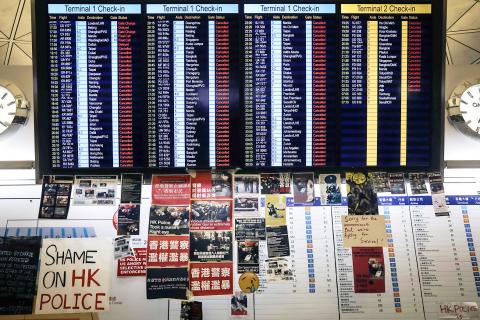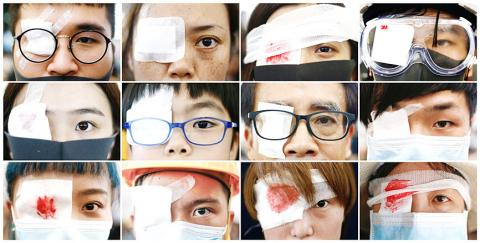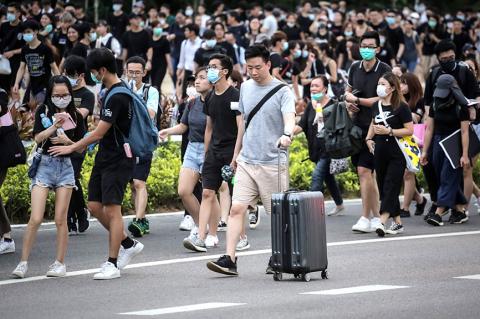One of the world’s busiest airports yesterday canceled all flights after thousands of pro-democracy demonstrators crowded into the main terminal of Hong Kong International Airport, while the central government in Beijing issued an ominous characterization of the protest movement as something approaching “terrorism.”
The extreme action by the largely leaderless movement seemed calculated to prompt a stern response from Beijing, and Chinese President Xi Jinping’s (習近平) administration responded within hours.
The Chinese State Council’s Hong Kong and Macau Affairs Office issued a statement saying the situation in Hong Kong was “beginning to show the sprouts of terrorism” and constituted an “existential threat” to the population.

Photo: AFP
“One must take resolute action toward this violent criminality, showing no leniency or mercy,” said the statement, attributed to spokesman Yang Guang (楊光). “Hong Kong has reached an inflection point where all those who are concerned about Hong Kong’s future must say ‘no’ to law breakers and ‘no’ to those engaged in violence.”
No new violence was reported by yesterday evening, although the territory remained on edge after more than two months of near-daily and increasingly bloody confrontations between protesters and police.
Beijing tends toward a broad definition of terrorism, including in it nonviolent protests of government policies on the environment or in minority regions such as Xinjiang and Tibet.

Photo: Reuters
Such a designation adds to the regime’s descriptions of protesters as clowns, criminals and traitors intent on overthrowing Chinese rule in Hong Kong.
A crowd of protesters that authorities said numbered more than 5,000 descended on the airport yesterday carrying placards and chanting slogans about police violence.
Hong Kong International Airport said in a statement the demonstration “seriously disrupted” airport operations.

Photo: AFP
Only flights that had already started boarding or those cleared for landing were allowed to use runways at the airport.
“All other flights have been canceled for the rest of today,” the airport statement said.
It later said flights would resume at 6am this morning.
Joydeep Chakravarti, a software engineer whose connecting flight to San Francisco was canceled during a layover in Hong Kong, expressed frustration that he was told to leave the airport when he wanted to stay inside the terminal.
“I don’t know what’s out there, so I don’t want to leave. I didn’t make any plans for Hong Kong,” said Chakravarti, who had a carry-on bag with laptop, charger and an extra shirt while the rest of his luggage already was checked in on his Singapore Airlines flight.
A massive traffic jam soon formed on the highway leading back to Hong Kong’s city center, but hundreds of protesters remained in the arrivals hall well into the night with no sign of leaving.
Some protesters were seen walking toward the airport amid the stifling heat.
At the airport, a flight attendant protesting on his day off, who gave only his surname, Lau, to avoid repercussions from his employer, said heavy-handed police tactics had alienated some people.
“The police have told a lot of lies to Hong Kong people. We cannot believe them anymore. We have to come here to protest,” Lau said.
Another protester, who identified herself only as Bea, said she took the day off from work to express her outrage because “I feel that I have to do something ... It’s just too sad to see what has happened. The police action has gone totally nonsensical.”
Later yesterday, two Chinese state media outlets ran videos showing armored personnel and troop carriers purportedly driving to Shenzhen, which borders Hong Kong.
The Global Times said the Chinese People’s Armed Police were assembling “in advance of apparent large-scale exercises.”
In an interview in Berlin, Chinese dissident artist Ai Weiwei (艾未未) said China’s leadership can now only resort to force, since it has failed in its quest to win hearts and minds in Hong Kong.
“Hong Kong people will not be the loser, because they’re on the right side of history,” he said.
Additional reporting by AFP

Conflict with Taiwan could leave China with “massive economic disruption, catastrophic military losses, significant social unrest, and devastating sanctions,” a US think tank said in a report released on Monday. The German Marshall Fund released a report titled If China Attacks Taiwan: The Consequences for China of “Minor Conflict” and “Major War” Scenarios. The report details the “massive” economic, military, social and international costs to China in the event of a minor conflict or major war with Taiwan, estimating that the Chinese People’s Liberation Army (PLA) could sustain losses of more than half of its active-duty ground forces, including 100,000 troops. Understanding Chinese

The Ministry of Foreign Affairs (MOFA) yesterday said it is closely monitoring developments in Venezuela, and would continue to cooperate with democratic allies and work together for regional and global security, stability, and prosperity. The remarks came after the US on Saturday launched a series of airstrikes in Venezuela and kidnapped Venezuelan President Nicolas Maduro, who was later flown to New York along with his wife. The pair face US charges related to drug trafficking and alleged cooperation with gangs designated as terrorist organizations. Maduro has denied the allegations. The ministry said that it is closely monitoring the political and economic situation

‘SLICING METHOD’: In the event of a blockade, the China Coast Guard would intercept Taiwanese ships while its navy would seek to deter foreign intervention China’s military drills around Taiwan this week signaled potential strategies to cut the nation off from energy supplies and foreign military assistance, a US think tank report said. The Chinese People’s Liberation Army (PLA) conducted what it called “Justice Mission 2025” exercises from Monday to Tuesday in five maritime zones and airspace around Taiwan, calling them a warning to “Taiwanese independence” forces. In a report released on Wednesday, the Institute for the Study of War said the exercises effectively simulated blocking shipping routes to major port cities, including Kaohsiung, Keelung and Hualien. Taiwan would be highly vulnerable under such a blockade, because it

UNRELENTING: China attempted cyberattacks on Taiwan’s critical infrastructure 2.63 million times per day last year, up from 1.23 million in 2023, the NSB said China’s cyberarmy has long engaged in cyberattacks against Taiwan’s critical infrastructure, employing diverse and evolving tactics, the National Security Bureau (NSB) said yesterday, adding that cyberattacks on critical energy infrastructure last year increased 10-fold compared with the previous year. The NSB yesterday released a report titled Analysis on China’s Cyber Threats to Taiwan’s Critical Infrastructure in 2025, outlining the number of cyberattacks, major tactics and hacker groups. Taiwan’s national intelligence community identified a large number of cybersecurity incidents last year, the bureau said in a statement. China’s cyberarmy last year launched an average of 2.63 million intrusion attempts per day targeting Taiwan’s critical